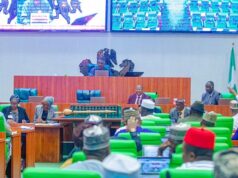Nigeria’s food production is being hampered by perennial flooding and water pollution in the country.
Delta State Governor, Rt. Hon. Sheriff Oborevwori, said this at the 2023 World Food Day Celebration with the theme: “Water is life, water is food, leave no one behind” held at the Cenotaph, Asaba, on Monday, October 16.
He called on the Federal Government, subnational government and the United Nations to tackle these menaces.
The governor, who was represented by his Deputy, Sir Monday Onyeme, said the aim of the day was to promote global awareness and action for those who suffer from hunger, and to highlight the need to ensure healthy diets for all.
He said although water makes up over 50 per cent of our bodies and covers about 71 per cent of the Earth’s surface, only 2.5 per cent of water is fresh, suitable for drinking, agriculture, and for most industrial uses.
“It is important to emphasize that water is a driving force for people, economies and nature and the foundation of our food.
“Data from FAO further shows that the global food system relies heavily on water resources, with Agriculture consuming 72 per cent of the world’s fresh water.
“In addition, 95 per cent of our food is produced on land (soil and water) and 600 million people rely on aquatic food system for livelihood.
2024 Budget: FG projects N26trn as debt servicing gulps N8.25trn
“The increasing stress on our planet’s water resources due to increasing population growth, urbanization, economic development and climate change, makes effective water management essential for sustainable food production,” he stated.
He said Delta State was blessed with an environment suitable for agriculture, fish production and its value chain.
“With land that is suitable for the cultivation of virtually every crop, the state has 17,698 square kilometres of landmass with 1,770 square kilometres that is made up of fresh water swamp and 5,840 square kilometres of mangrove swamp.
“However, pollution is a major challenge that is hampering full utilization of water resources in our state and the country in general.
“Due to pollution as a result of oil exploration activities, we cannot fully harness the abundant economic potentials of our rivers and rivulets. It is common to see waste dumped in rivers and streams.
“Poor water quality is affecting our people, the economy and the environment. This is an area that the Federal Government and the United Nations should tackle if we are to have full benefits of our water resources today and in the future.”
Oborevwori also said flood had become a recurring decimal in Delta and many other states of the country, adding, “This has made farmers not to be sure if they will have full economic benefits from their yearly activities in the area of cultivation of crops or engaging in fish farming.
“The loss by farmers, as a result of flood, cannot be quantified as its psychological effects on our people is enormous. Our state, Delta, is listed among the states that will be affected by flood this year.”
He expressed elation at the high demand for agricultural produce from Delta State in different parts of the world, from oil palm, maize, cassava, yam, fruits, vegetables, tomatoes, pepper, poultry and fish from both fresh water and brackish water to tapioca, spices, among other agricultural products and by-products.
Welcoming guests earlier, the Commissioner for Agriculture and Natural Resources, Mr. Perez Omoun, said the state government places great premium on the agricultural sector by embarking on various programmes aimed at improving the agricultural value chain in line with the MORE Agenda of the governor to ensure all Deltans had access to adequate quality and quantity of food and water.
He through the Delta State Accelerated Agricultural Development Scheme (AADS), the State Government was developing three sites for greenhouse farming across the three agro ecological zones at Mbiri in Ika North-East LGA, Deghele in Sapele LGA and Kpakiama in Bomadi LGA.
The commissioner said over 300 cassava farmers were empowered to cultivate 330 hectares of farmland across the state and the government is working seriously to increase this figure through direct investment and partnership.
- Nigeria’s food production hampered by flood, pollution – Oborevwori - October 16, 2023
- Oborevwori lauds judiciary as judges visit gov - October 10, 2023
- Itsekiri women block DESOPADEC office, protest over PIA - September 7, 2023









